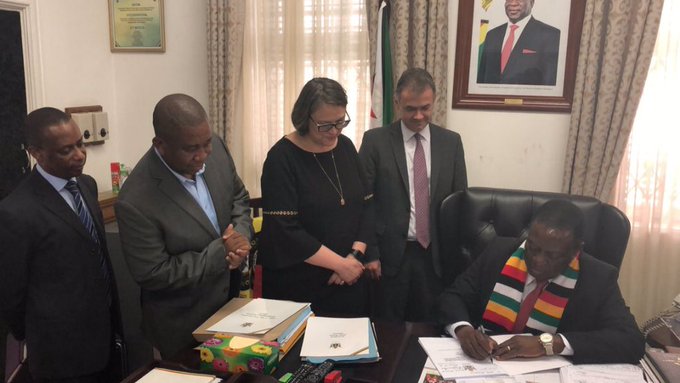By Anyway Yotamu and Joyce Mukucha
The Government of Zimbabwe is taking strides to adopt the International Public Sector Accounting Standards (IPSAS) to ensure that there is improvement of both quality and comparability of financial information reported by the public entities.
The framework is also aimed at strengthening good corporate governance, accountability, transparency and decision making of all Government enterprises and parastatals.
In her key note address during the Change Management Workshop for Heads of Boards and Commissions held in Harare on the 9th of October 2019, the Deputy Accountant General in the Ministry of Finance and Economic Development Ms Catherine Mavheneka said that adoption of IPSAS by Government will help to improve transparency and accountability in the management of public resources as required by the Constitution of Zimbabwe.
“This programme gives me pleasure in a special way since it brings improvement in the public finance management as well as enhancing integrity and high quality accounting standards. The President Cde Emmerson Mnangagwa has begun implementing IPSAS and embracing of the framework by corporates is of paramount importance as it helps in making them relevant and responsible and this will lead to sustainable development of our nation,” she said.
Mavheneka highlighted that there were a plethora of challenges that were being encountered in as far as reporting of financial reporting in the public sector was concerned. According to the latest audit reports, she said, issues of governance and non-compliance continued to be raised.
“The Auditor General recently publicised the 2018 audit report and out of the ninety five state enterprises and parastatals audited, 29 had adverse opinions while 10 had qualified opinions and one had a disclaimer of opinion. The major concern was non-submission of financial statements. For local authorities, 70 failed to submit financial statements in 2018 and only 3 managed to submit. This is disheartening since this will be difficult for us to account all the assets in government.”
She emphasised that it was their hope that the workshop would go a long way in addressing such issues. Submission of complete financial statements will help to support certain expenditures and ensure that quality financial reporting is not compromised. Government has partnered with various stakeholders such as Institute of Chartered Accountants of Zimbabwe (ICAZ) to ensure that there is effective management of public resources.
The Esami Consultant Mr Felix Kamau said the adoption of IPSAS support the convergence of the international and national standards, convergence of accuracy and financial statistics thereby increasing disclosure in financial statements. The implementation of IPSAS, he said, would enhance better management of resources leading to better public services; enable lowering the cost of doing business; improves public trust as well as help in the identification of liabilities and assets.
“We must move in the same direction of adopting IPSAS as it helps improving quality of financial reporting in the public sector and integrity will be achieved. The IPSAS defines the objective of financial reporting by public sector entities so as to provide information about the entity that is useful to users of general purpose financial reports for accountability purposes and for decision making processes. We are interested in getting the right financial report framework which is anchored on a number of things such as national and local legislation required by law, the Acts for example Public Financial Management Act,” he said.
The key stakeholders to be engaged with IPSAS include the public, government, investors employees, financiers, development partners, parliamentarians, and civic organisations among others.
Stakeholders who participated during the workshop pointed out that though the adoption of the framework was important. There are a lot of challenges which might be encountered concerning its implementation. These include resistance to change, macro-economic environment, lack of competence and capacity among others.






